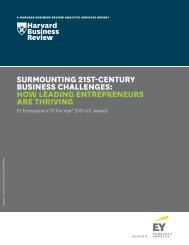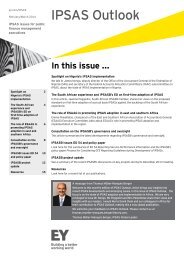Create successful ePaper yourself
Turn your PDF publications into a flip-book with our unique Google optimized e-Paper software.
Africa 2030: Points of viewRapid GDP growth the ‘new normal’ in sub-Saharan AfricaBusiness Action for AfricaBusiness Action for Africa is a group of companies and international development organisations,working collectively to harness the development impact of business in Africa. Business Action forAfrica helps catalyze an evidence-based conversation about the role of business in Africa - that bothinforms and inspires positive action.Rapid GDP growth is the new normal in sub-Saharan Africa, withthose few countries still struggling with growth in low single digits,or contracting GDPs due to internal political disruptions now beingthe exception, rather than the rule.This growth is being driven by factors we know well, namelythe emergence of industrial powers in Asia and Latin America,continents that need Africa’s natural resources. This demandfor natural resources in Africa has, in turn, driven the rapidurbanisation, which has placed pressure for the system oftraditional subsistence agricultural practices to adopt commercialfarming to maximise the productivity of the huge tracts of landavailable on the continent.A ‘side effect’ of the urbanisation is the expansion of an Africanmiddle class, which the African Development Bank estimates isnow 300 million-strong. This burgeoning class is consuming andinnovating, building and supporting businesses in retail, telecoms,real estate, construction, technology and media.Global consumer goods companies, such as Unilever, Diageo,Coca-Cola and SABMiller, have benefited from the sharp risein consumer spending that has resulted from Africans’ risingaspirations and expectations. Local banking groups have emergedto challenge models, built up over decades, that favoured lending togovernments over lending to private enterprise. Capital is thereforebeginning to flow into innovative new companies.Mobile telephony, and in particular mobile money, has begunto change the shape of African business. A new cohort ofentrepreneurs has emerged, using technology to break downsocial and economic barriers, building Africa-centric solutions tohealthcare, agriculture, retail and finance.But tressing these domestic factors is a global change in how thecontinent is perceived.Over the past decade, the African narrative has shifted, with ‘AfricaRising’ overtaking the older, preconceived notions of a continentlocked in political turmoil and economic stagnation. Global banks,such as Standard Chartered, have pushed further into Africanmarkets, replacing the old models of ‘suitcase banking’ withdeepening networks and locally-sourced and trained talent.These significant strides forward have a long way yet to run, andif their current courses are maintained, will ensure that Africain 2030 is a different world to that of 2014. However, there areother possible outcomes, as the progress is fragile, and, as yet,incomplete.The demographic dividend has a significant downside — hundredsof millions of Africans will enter the workforce over the nextdecade. These young people will need to have access to productiveemployment, and will require the political and economic freedomto meet their aspirations. Poverty reduction has not kept pace withgrowth across the continent, and for every young entrepreneur whofinds financing for his or her idea in the city, there are many otherswho remain wedded to cycles of poverty and insecurity.Growth without inclusion is unsustainable.In Nigeria, now the largest economy on the continent — ahydrocarbon-driven economy with fast-growing consumer markets,agriculture and manufacturing — inequality is widely acknowledgedto be fuelling the civil conflict in the north-east which burst intothe public consciousness in April, when more than 200 girls werekidnapped by the Islamist group Boko Haram.The tragedy of the Ebola outbreak in West Africa has demonstratedthat for all of the progress in that region, healthcare systems arestill brittle. Droughts in the Horn of Africa have led to hunger, evenin countries developing as fast as Kenya.The runaway urbanisation, which is so often used to illustrate thegrowth potential of African markets, is marked by overstretchedinfrastructure and by rising populations in informal settlements.These are not impossible problems to overcome, but they requiremore than simple positivity — they require strategic thinkingand long-term solutions. They require financing, expertise andcommitment from the public sector, but also from the privatesector. They require more than just business as usual, but new,innovative approaches to development challenges that can be takento scale.The good news is that many companies, from multi-nationals downto startups, are awake to their moral and commercial imperative toparticipate fully in the growth of the societies that host them.38





